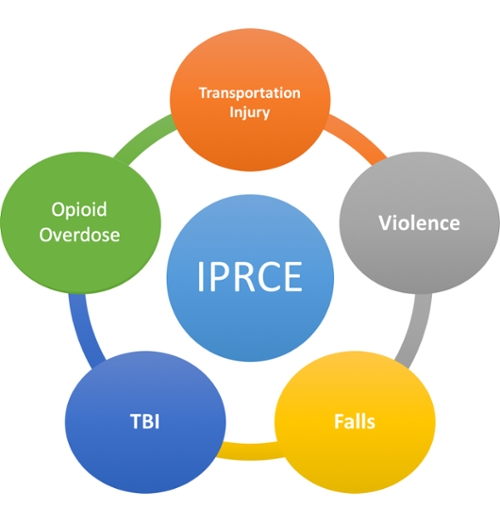
ATLANTA – The Centers for Disease Control and Prevention (CDC) has awarded $4.2 million over the next five years to fund the Injury Prevention Research Center at Emory (IPRCE), a center designed to reduce the top causes of injury and injury death in Georgia and the Southeast through research, education and outreach. IPRCE is one of nine centers in the U.S. being funded by the CDC’s National Center for Injury Prevention and Control under the Injury Control Research Center program.
A part of the Department of Emergency Medicine in Emory University School of Medicine, IPRCE is a multi-institutional center that has collaborations with 12 universities, over 40 faculty members and more than 50 injury prevention organizations. It is the only center of its kind in Georgia. The team works together to provide a multidisciplinary vision for research and prevention to reduce the burden of injury throughout the state and beyond. The center would not be possible without the strong support and financial commitments from the Woodruff Health Sciences Center, Emory’s School of Medicine, Rollins School of Public Health and Nell Hodgson Woodruff School of Nursing.
“IPRCE is designed to advance the field of injury prevention through the development of new scientific research and/or surveillance methods, creation of new knowledge, translation of knowledge in practice, program and policy development and evaluation of activities that will ultimately reduce injuries and death,” says Jonathan Rupp, PhD, associate professor of emergency medicine, Emory University School of Medicine and principal investigator of IPRCE. “We are excited to receive this new funding from the CDC to help us better assist Georgians to mitigate and eliminate the impact of injury in our community.”
IPRCE, formerly known as the Emory Center for Injury Control, has existed since 1993 and previously received CDC Injury Control Research Center funding from 2009-2013. This most recent funding will support the center through July 2024.
As part of a national injury prevention research effort, IPRCE reflects national research priorities by focusing on prevention of the five top causes of injury death across the human lifespan, which include:
- Drug safety (opioids)
- Violence
- Motor vehicle crashes
- Falls
- Traumatic brain injury
IPRCE has developed large, integrated task forces that bring together experts from these five areas to identify gaps in knowledge, generate research to cover those gaps and create high-impact education and training programs aimed at injury prevention.
“In Georgia, over 47,000 people are injured severely enough to be hospitalized each year; that’s one injury every 11 minutes,” says David Wright, MD, professor and interim chair of the Department of Emergency Medicine at Emory and co-investigator of IPRCE. “By targeting these five prevention areas, we hope to save lives and reduce events through collaboration and partnership.”

“The Woodruff Health Sciences Center is pleased to support IPRCE, its missions and initiatives to prevent injury throughout the state of Georgia,” says Jonathan S. Lewin, MD, executive director, Woodruff Health Sciences Center and president, CEO and chairman of the board of Emory Healthcare.
IPRCE is made up of four core areas of focus including an administrative core, an education and training core, an outreach core and a research core. As part of the administrative core, Sharon Nieb, PhD, with Emory will oversee the day to day operations of IPRCE. The education and training core is led by Dorian Lamis, PhD, and Sheryl Heron, MD, MPH, both from Emory School of Medicine. The outreach core is led by Lisa Dawson from the Georgia Department of Public Health, and the research core is led by Hannah Cooper, ScD, from Emory’s Rollins School of Public Health.
Sixty percent of IPRCE’s Injury Control Research Center funding will go to four research projects, and over 15 pilot grant opportunities over the next five years. The four research projects are:
- Organizational readiness of hospitals in the Georgia trauma system to implement the Cardiff Model for violence prevention in the community
- Advancing opioid overdose surveillance in rural areas for abuse prevention and response
- Addressing adverse childhood experiences among Hispanic caregivers in a pediatric primary care population to improve child health and decrease early adversity
- Adverse childhood experiences and suicidal behaviors in African Americans; assessment and prevention
“The leadership at IPRCE and the center’s many partners have diligently worked together to redevelop this program and achieve the needed funding to move forward for the next five years,” says Vikas Sukhatme, MD, ScD, dean of Emory University School of Medicine. “We are proud of their accomplishments and look forward to their research findings and important work in this arena.”
“We’re excited for the work that IPRCE will do to bring together researchers from the Emory community to address the injury problems affecting Georgians,” says Gary Teal, vice president of Emory University’s Woodruff Health Sciences Center.
Major partners working in coordination with IPRCE include Grady Memorial Hospital, Children’s Healthcare of Atlanta and the Georgia Department of Public Health.
